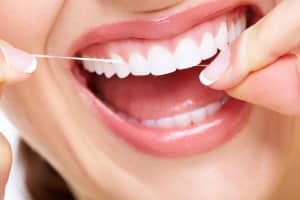 The best way to prevent dental disease is to take good care of your teeth and gums on a daily basis. Good oral hygiene habits are easy, accessible and affordable, so there’s no excuse to skip at-home dental care. You don’t need complicated equipment or special skills to brush and floss your teeth, two habits that drastically reduce the occurrence of cavities and gingivitis. Twice-daily brushing and daily flossing are two tips to prevent tooth decay and gum disease, in addition to healthy diet choices, dental appointments, and early detection.
The best way to prevent dental disease is to take good care of your teeth and gums on a daily basis. Good oral hygiene habits are easy, accessible and affordable, so there’s no excuse to skip at-home dental care. You don’t need complicated equipment or special skills to brush and floss your teeth, two habits that drastically reduce the occurrence of cavities and gingivitis. Twice-daily brushing and daily flossing are two tips to prevent tooth decay and gum disease, in addition to healthy diet choices, dental appointments, and early detection.
8 Preventive Dentistry Tips for a Healthy Mouth
1. Brush your teeth every morning and every night: This should be a task you have perfected by the time you’re an adult. It is vital that you brush your teeth twice a day, each morning and night.
2. Floss at least once daily: You must floss every day, because your daily brushing is not complete or nearly as effective to prevent disease without flossing. Flossing cleans the crevices and hard-to-reach places that your toothbrush misses, so it is vital to prevent cavities and gingivitis.
3. Use fluoridated toothpaste: Fluoride helps strengthen your tooth enamel, which is the outermost protective layer of your teeth. When your tooth enamel is strong and resilient, it is less likely you’ll experience tooth decay.
4. Avoid sugary and starchy foods and beverages: The sugars and starches in your favorite sweets react with the bacteria in your mouth to produce an acid that erodes and weakens your tooth enamel. This makes your teeth more susceptible to tooth decay.
5. Visit your dentist every six months for twice-yearly checkups and cleanings: Professional dental cleanings are important because not everything can be removed at home, namely hardened tartar buildup. Regular dental exams detect symptoms of disease so they can be treated and reversed.
6. Don’t ignore discomfort: If you’re experiencing a toothache or dental discomfort, don’t ignore it. It’s best to consult your dentist right away to ensure your pain is not a symptom of a serious underlying problem.
7. Wear a mouth guard if you grind your teeth: Do you have signs of grinding your teeth while you sleep, also known as bruxism? Consult your dentist about wearing a mouth guard as you sleep to prevent further damage to your teeth and reduce grinding.
8. Use anti-bacterial mouthwash: Rinse with mouthwash that helps manage the bacteria levels in your mouth to prevent acid erosion of your enamel.



